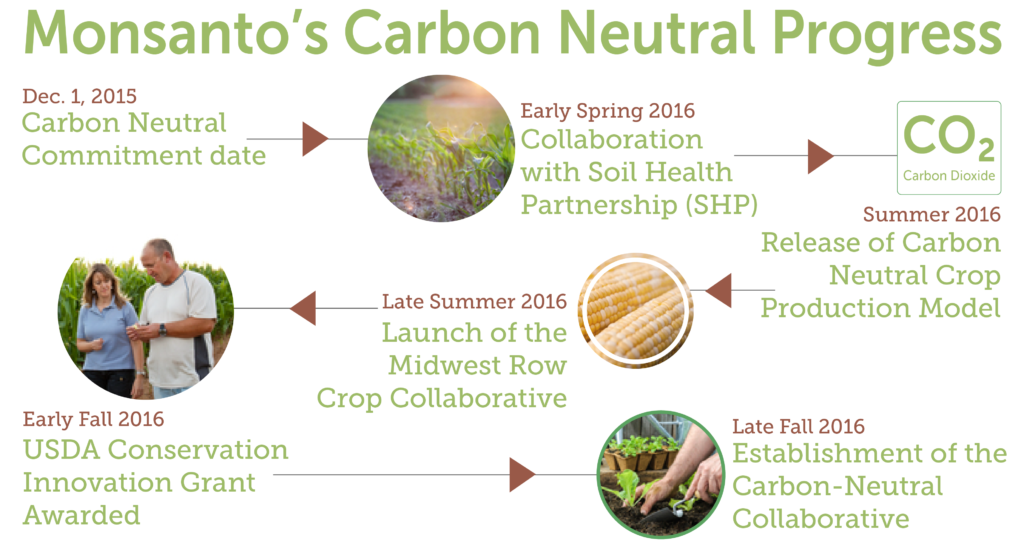Stories | May 11, 2017 | Read Time: 4 minutes
Our Journey to Become Carbon Neutral

Reducing the world’s greenhouse gas (GHG) emissions from agriculture to help address climate change can only happen if we, as an ag industry, commit to work together and act boldly. That’s why one year ago—on Dec. 1, 2015—Monsanto announced its intention to do its part in helping tackle climate change by both making our operations carbon neutral by 2021 and by acting as leader in positioning modern agricultural practices as a path to increased sustainability.
We know pursuing sustainability will require close collaboration with other leaders in our industry, so Monsanto established a consortium of leading experts on agricultural greenhouse gas emissions to help create a framework for measuring greenhouse gas emissions related to ag practices and, at the same time, advise Monsanto on its progress against our company goals to reduce carbon intensity. The Carbon-Neutral Collaborative met for the first time on Nov. 29, 2016.
Between the announcement last winter of our Carbon Neutral Commitment and the first formal meeting of the Carbon-Neutral Collaborative, Monsanto has achieved several highly significant milestones. Here are some of the highlights:
Spring 2016: Soil Health Partnership (SHP) expands field sites. In 2014, nearly two years before Monsanto made its commitment to carbon neutrality, we collaborated with the National Corn Growers Association and its SHP initiative to help identify, test, and measure farm management practices that improve soil health. At this point, the SHP has engaged 65 growers to research and demonstrate climate-smart agriculture practices, and with Monsanto’s commitment to continue support, will now expand to 100 growers throughout the Midwest and share their learnings to advocate for increased adoption of carbon neutral practices.
Summer 2016: Release of Carbon Neutral Crop Production Model. Monsanto commissioned third-party expert ICF International to examine the potential for reducing greenhouse gas emissions from agriculture in the United States. The report, “Charting a Path to Carbon Neutral Agriculture: Mitigation Potential for Crop-Based Strategies,” shows that if recommended sustainable practices are adopted more widely across ag, more than 100 million metric tons of carbon dioxide-equivalent emissions could be reduced in the United States alone. This study directly aligns with the U.S. Department of Agriculture’s Roadmap of the Building Blocks for Climate Smart Agriculture & Forestry released in May 2016 and helps define how agriculture can be a part of the solution to GHG emissions and increased sustainability.
Late summer 2016: The Midwest Row Crop Collaborative is launched in August at the Farm Progress Show. This effort brings together Monsanto and leading food and agriculture companies, such as WalMart, General Mills, Cargill and others, to support farmers in the improvement of soil health and water quality. Best management practices that improve soil health also directly help reduce GHG emission. Monsanto is one of the founding members and working collaboratively with these leading companies and environmentally focused NGO advisors to help support and advance modern agriculture.
Fall 2016: The U.S. Department of Agriculture-Natural Resources Conservation Service (USDA-NRCS) awarded the National Corn Growers Association a $1 million Conservation Innovation Grant. The award supports work in the area of climate change by helping study, account, and understand how the adoption of carbon neutral farming practices can help reduce and sequester GHG emissions. Monsanto matched the grant with a $1.6 million investment to help fund the work and helped convene other leaders to support with in-kind service and advise.
Late fall 2016: The Carbon-Neutral Collaborative is established. As mentioned above, this group of experts from universities and professional organizations is helping Monsanto achieve its goal of carbon neutrality. The Carbon-Neutral Collaborative will help develop a transparent, scalable, and verifiable carbon accounting framework that will measure and report carbon reductions. The carbon reductions will be based on the adoption of specific agricultural practices and systems.
As Monsanto continues efforts to mitigate climate change and convene collaborators, we invite you to read more about our shared progress at Monsanto.com/climatechange.









